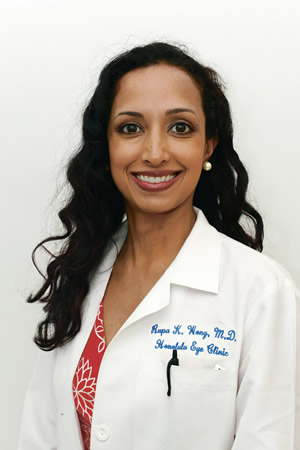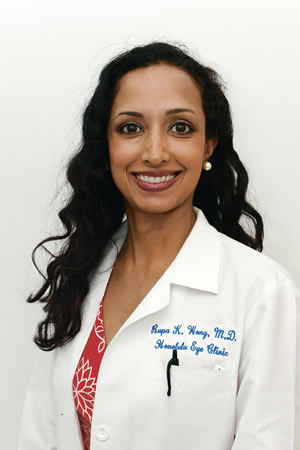Keeping Keiki’s Eyes Healthy
Dr. Rupa Wong
Pediatric ophthalmologist at Honolulu Eye Clinic
Where did you receive your schooling/training?
I attended Duke University, and then earned my medical degree at Cornell University Medical College. After graduation, I did my residency in ophthalmology at New York University and Manhattan, Eye, Ear and Throat Hospital. At Harvard’s pediatric hospital, Children’s Hospital Boston, I completed a specialized fellowship in pediatric ophthalmology and adult strabismus, where I had the opportunity to perform complex pediatric cataract, glaucoma, eye muscle and oculoplastic surgeries, as well as adult thyroid eye surgeries.
I am a board certified ophthalmologist, with a specialty in pediatric ophthalmology and adult strabismus. I am also board certified as a diplomate of the American Board of Ophthalmology and a fellow in the American Academy of Ophthalmology, and a member of the American Academy of Pediatric Ophthalmology and Strabismus.
How long have you been practicing?
I have been practicing for five years now.
What are some of the more common pediatric eye issues you treat?
The most common pediatric eye issue that I treat is strabismus, which is when the eyes are not aligned with one another. One eye may gaze straight ahead, while the other eye turns inward, upward, downward or outward. Strabismus most often begins in early childhood. Some parents and even pediatricians mistakenly think that this is a cosmetic disorder, which it is not. Strabismus actually affects the development of vision in children, as well as inhibiting psychosocial interactions with others. This is why the surgery to correct strabismus is covered by medical insurance. Sometimes, glasses or eye exercises are all that is necessary, but in other cases, surgery is required. Strabismus can affect adults as well, and usually causes double vision in these cases. It may be related to thyroid disease or other causes such as stroke, diabetes or myasthenia gravis. Eye alignment surgery improves eye function in most adults and can lead to social and economic benefits. Studies have shown that misaligned eyes can hinder social interactions, self-confidence and employment opportunities.
Another condition that I treat is amblyopia, which most people know as “lazy eye.” This refers to reduced vision from lack of use in an otherwise normal eye. It usually only occurs in one eye, though, can occur in both. Usually, glasses and/or patching the dominant, “good” eye is required to strengthen the vision in the weaker eye.
I also see a number of children for conjunctivitis or “pink eye” and styes. Conjunctivitis can be caused by a virus, bacteria or even allergies, and the treatment differs for each one. Styes are usually caused by a blocked oil gland in the eyelid and can cause swelling and redness along the eyelid. The most common reason I see children is for blurry vision, requiring glasses.
How often should keiki get eye checkups?
I recommend that all children have their vision checked at their 3- or 4-year-old visit at the pediatrician’s office. If the pediatrician is unable to check the vision with an eye chart, then the parents should bring them in to a pediatric ophthalmologist. Up to 25 percent of school-age children have vision problems that can affect them developmentally or affect learning. Diagnosing vision problems early can help children develop to their full potential.
What symptoms should family members be aware of in their keiki when it comes to eye health – something that says it’s time to see an ophthalmologist?
This is almost too numerous to mention! Parents should bring their child in if they notice wandering or crossed eyes, redness, drooping of the lid, excessive blinking, tearing or crusting. Also, they should pay attention to their child’s complaints or school performance. Does their child tilt or turn their head when seeing, squint or close one eye, lose his place when reading, stumble when walking or hold printed material in unusual manner? Do they complain of eye pain, headaches or double vision?
Anything else you’d like to add about keiki eye health?
Parents should trust their instincts. If you feel that something is “not right” with your child’s eyes, get them checked out. You know your child. Please do not listen to anyone (doctor or otherwise) who tells you that your child is too young to have their eyes are examined. I examine infants in my office all the time and I am able to determine if their eyes are healthy and even if they need glasses!







